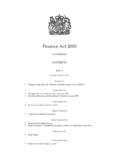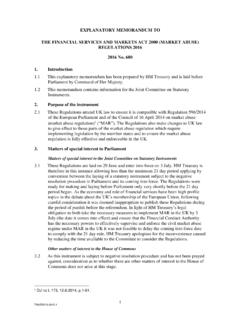Transcription of Big market: how localism and the ‘big society’ damage ...
1 Big market May 2011 Page 1 National Coalition for Independent Action (NCIA) is a network of individuals and organisations who believe there is a need to defend independent voluntary and community activity. This paper was written as a policy resource to help NCIA activists to analyse the government s ideas for our sector, expressed in the concept it calls big society .BIg CuTs: The polIC y BACkgrouNdBefore the change of government in May 2010, voluntary and community sector organisations were already finding it difficult to respond to increased need for their services because of the recession. They are now also having to contend with billions of pounds of government funding cuts. Cuts to public services are an ideological decision, not a necessity. Economists including Nobel Prize winner Paul Krugman and former World Bank chief economist Joseph E Stiglitz have shown that cuts will be damaging to the growth of the The ideology behind these cuts is a commitment to the reduction or complete removal of the universal and equal right to healthcare, welfare benefits, education, legal aid and other services.
2 The combined effects of the government s cuts, its privatisation agenda and its localism plans (of which the idea of big society is part) will be reduced public and community A pattern is emerging which shows that the less privileged you are, the more the cuts will affect your life. We are returning to an earlier time in British history, when poor people relied on the charity of the rich where they could get John Medhurst and Enrico Tortolano, PCS on Privatisation , Public and Commercial Services Union, 2010: See NCIA s paper on commissioning and privatisation, Voluntary Action under Threat , 2011 . NCVO, The Big Society the Evidence Base , July 2010, p11/20: slashing of spending on public services and the voluntary sector is an attack on everything that would be necessary to create the society David Cameron says he wants, in which the innovation, the can-do spirit and the imagination of people drives things.
3 New initiatives and ideas need funding, and running a community centre or a library needs experienced people and resources. Geoff Mulgan, chief executive of the Young Foundation, said: Many in the sector fear that the Big Society Bank s funds will be directed only to low-risk established ventures, and steer clear of genuine innovation. Dame Elisabeth Hoodless, former chief executive of CSV, Britain s largest volunteering charity, said on Radio s Today programme: There are a lot of very worthwhile programmes for example volunteers working in child protection as promoted by the minister for children which are now under threat of s about one hand not appreciating what the other hand s doing. David Cameron in his speech launching the big society , 2010: The Independent, Cameron s big society relaunch runs into big trouble , 1 February 2011 : 0.
4 Html Today programme, Radio , 7 February 2011 : 7897 Big market: how localism and the big society damage independent voluntary Big market May 2011 Page 2Is this apparent contradiction because the government is not actually interested in the level of innovation or effectiveness of what happens in our local areas, but is seeking a justification for not paying for it? Cabinet Office Minister Francis Maude said in response to Hoodless comments: Building the big society is not about pouring taxpayers money into the voluntary sector. What we are doing is supporting a new culture where everyone gets involved and society stops relying on the state to provide all the answers. I believe too much time is spent asking the taxpayer to prop up traditional organisations. 7 elemeNTs of The BI g soCI eTy a small grants fund about the same scale as the previous government s Grassroots Grants programmea training programme for community organisersa National Citizen s Service to put 1 year olds on volunteering programmesa big society day to celebrate volunteeringprivate sector mentors for people wanting to set up co-operatives and mutuals to take over servicesthe big society bank money from dormant bank accounts which will be used for loans to social enterprises8 BIg whAT?
5 The big society fits with other government policies in that its major concern is increasing the power of businesses and already powerful individuals. The government wants to institutionalise the idea that the preferred way to fund traditionally charitable activity is through social enterprise 9 methods: loans and income generation through contracts, charging or trading, rather than grants or other public These are steps towards ending government support for voluntary action completely. In the gap between what the state won t provide, determined by the cuts, and what the private or voluntary sector can t make money from, people will be left to make their own Third Sector, Francis Maude denies spending cuts undermining big society , 2011 : 2 /Francis-Maude-denies-spending-cuts-unde rmining-big-society/8 The involvement of the banks in this scheme has been in return for promises by the government that it will not increase their regulation.
6 See Sky news blog, 2011 : :c 2 2fc-e28f- e11-a0 f-9 ab 7c 1b9 The term social enterprise is what you make it: there is no legal entity or form of governance called social enterprise. This allows a wide range of agencies to describe themselves in this way: co-operative shops in rural villages, consultancy firms making a difference, residential care homes, and the multi-million pound Welsh Water which pays its Chair 1 0,000 a See the recent NHS white paper Equity and Excellence: Liberating the NHS , July 2010, which states that the government aims to create the largest social enterprise sector in the world . The proposals are dismissed by nearly everyone in the voluntary and community sector when they are talking off the record. In public, some organisations engage with the big society as if they think it is a workable concept, lining up to help deliver it, in the hope that they can grab a piece of the ever-diminishing funding By declining to highlight the ideologically noxious thinking behind the big society , voluntary organisations are colluding in their own demise, allowing the government to turn all activity that used to be called charity , voluntary or civil society into business.
7 The big society is certainly lazy and cynical policy-making (if good things happen the government will claim credit for having enabled people to do things for themselves, if they don t it will be the fault of people for not being enterprising enough and expecting the state to fix their problems), but it is also much worse than that. Matt Scott, Director of the Community Sector Coalition, said: If someone wanted to set the sector back not just decades but into the Victorian era they could not do better. 12loCAlIsm: A BI g mArkeT of frAgmeNTed ANd uNACCouNTABle servIC esThe big society plans are linked to the government s localism Bill. Voters will be able to challenge how council services are run, force them to be tendered out and overrule planning decisions. As Matt Scott puts it: Local people are to be given the power to instigate local referendums in the hope that they might be persuaded to save local facilities threatened with closure and run them themselves a poisoned chalice if ever there was one.
8 1 Much has been made of the possibility of services coming under community control. However the right to challenge included in the bill is specifically intended to open up the public service market . In the absence of any genuine enabling and encouraging 1 of communities to take on services (in fact the reverse is happening as local charities and community provision are being decimated by cuts), it is the large corporate charities and the private sector which are taking on this role. The Independent reports that LSSI, an American firm which manages 1 public libraries across the US, has set itself a target to manage libraries in eight British local authorities by the end of the year and to capture 1 per cent of the market within five years .1 11 An example from Voluntary Action Stoke on Trent: Our key aim is to advance and promote the professional development of the Voluntary and Community Sectors (VCS) now known as Big Society.
9 From our dedicated Board of Trustees to our front line team, we have the skills and experience to help VCO s compete and prosper in the 21st Century marketplace. Matt Scott, Community Sector Coalition, 2011 : Matt Scott, Community Sector Coalition, as David Cameron, in his speech launching the big society , said that it would be about government enabling and encouraging people to come together to solve their problems and make life better , as .1 The Independent, as . Big market May 2011 Page Decentralised provision of services means fragmented provision. Private companies are accountable to their shareholders, not to communities. Charities are independent in structure and nature: they are designed to be responsive to their members, who may represent a small interest group.
10 Their trustees have a high level of autonomy and government regulation of them is light. This is appropriate for the services charities have traditionally provided outside of statutory provision. It is not appropriate for delivering services that need to be consistent nationally and answer to the whole has called for safeguards to ensure that the new mutuals have inclusive governance arrangements, are accountable to local communities and service users and that asset locks are in place .1 It is unlikely that the government will enforce this when it is making no such demands on corporations like LSSI. The head of the civil service has ordered an inquiry into the democratic impact of the localism Bill and the big society because of concerns over The information commissioner has warned that the accountability of the state will be eroded as more and more services are outsourced because everything from children s services to doctors practices could end up outside the scope of the Freedom of Information Act.







